
Metallyticus is a genus of praying mantis. It is the only genus in the monotypic family Metallyticidae. They are mostly found in South-East Asia. The species of the genus are dark, somewhat flattened and cockroach-like, and often with a cuticle that is reflective and metallic in appearance.

Mantoida is a genus of praying mantises in the family Mantoididae. The species of this genus are native to Mexico, Central America, and South America.
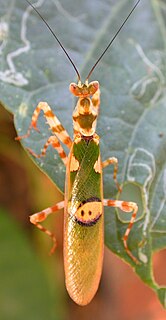
Creobroter is a genus of flower mantises in the tribe Hymenopodini; species are concentrated in Asia. The name comes from the Greek kreo-, meaning "flesh") and broter" meaning "eating", therefore, "flesh-eating", an apt name for a predatory insect. Both sexes have long wings and are capable fliers. Full-grown males are about 3 to 4 cm in length; females are about 4 to 5 cm.
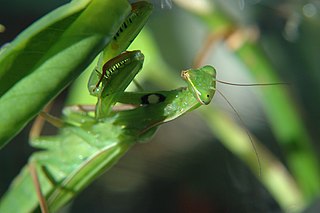
The genus Mantis is in the family Mantidae, of the mantis order Mantodea.

Paraoxypilus is a genus of mantis, known as the boxer bark mantises. They are native to Australia and Oceania.

Brunneria is a genus of praying mantises in family Mantidae. They are often called stick mantis for their slender shape and the species of the genus are native to the Americas.
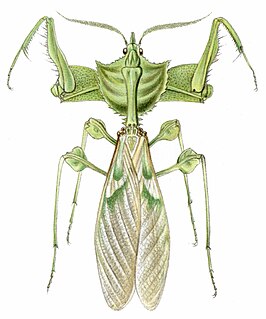
Idolomantis is a genus of praying mantises in the family Empusidae. It is represented by a single species, Idolomantis diabolica, commonly known as the devil's flower mantis or giant devil's flower mantis. It is one of the largest species of praying mantises, and is possibly the largest that mimics flowers

Iris is a genus of praying mantis found in Africa, Asia, and Southern Europe with one species, Iris oratoria, being introduced to North America in the south-western United States.

Rhombodera is a genus of praying mantises native to Asia and possessing common names such as shield mantis, hood mantis, and leaf mantis because of their extended, leaf-like thoraxes.
Bantiella is a genus of mantis in the family Thespidae.
Oxyothespis is a genus of praying mantis in the family Toxoderidae. Members of this genus have been called grass mantises.
Toxoderidae is a family of praying mantises.
Tarachodes afzelii, commonly known as the Tanzanian ground mantis, is a species of praying mantis in the family Eremiaphilidae. It is native to woodland in Western and Central Africa.

Mantises are an order (Mantodea) of insects that contains over 2,400 species in about 460 genera in 33 families. The largest family is the Mantidae ("mantids"). Mantises are distributed worldwide in temperate and tropical habitats. They have triangular heads with bulging eyes supported on flexible necks. Their elongated bodies may or may not have wings, but all Mantodea have forelegs that are greatly enlarged and adapted for catching and gripping prey; their upright posture, while remaining stationary with forearms folded, has led to the common name praying mantis.

Stenophylla is a genus of praying mantis in the subfamily Stenophyllinae, which is now placed in the family Acanthopidae. It the sole genus of the tribe Stenophyllini.
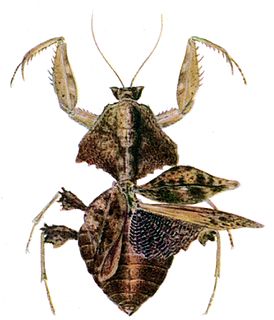
Brancsikia is a genus of praying mantises in the new (2019) family Majangidae and the monotypic subfamily Brancsikiinae; it was previously placed in the Deroplatyinae.
Epsomantis is a monotypic genus of mantis in the new (2019) family Nanomantidae. It represented by the single species, Epsomantis tortricoides.
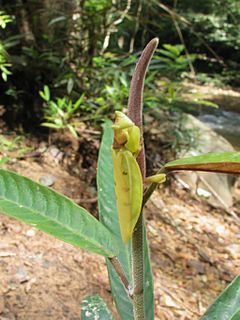
Parymenopus davisoni is an insect of the order Mantodea (mantises) from Southeast Asia, including Malaysia and Thailand.
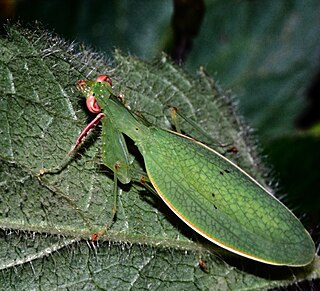
The Nanomantidae are a new (2019) family of praying mantises, based on the type genus Nanomantis. As part of a major revision of mantid taxonomy, genera and tribes have been moved here, substantially replacing the old family Iridopterygidae.














